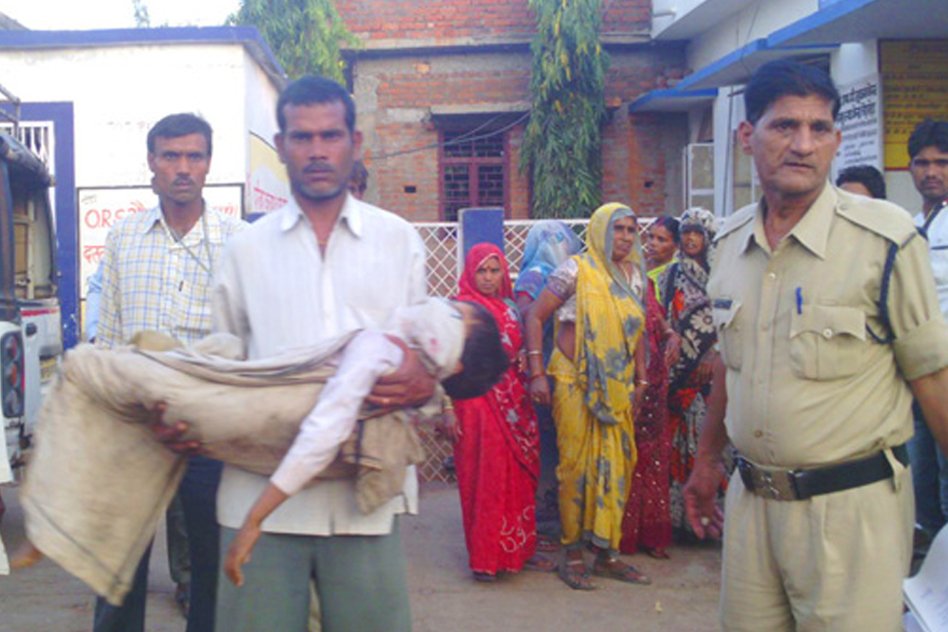Source & Image: Catch News|Author:Anup Dutta
The death
- Veeran Ahirwar, a student of Class III at Khamiriya Kala primary school, Madhya Pradesh, drowned in a well.
- He fell off the ledge of the well from which he was trying to draw water.
The eyewitness
- Veeran’s brother claims schoolteachers didn’t allow them near the school hand pump because they are Dalits.
- However, district collector Shriniwas Sharma claims the hand pump was crowded, which is why the boy went to the well.
More in the story
- An aggrieved father’s impassioned plea to the state administration.
- MP’s poor track record on discrimination, and what can be done to address it.
Denied water from a school hand pump, a Dalit boy, a student of Khamiriya Kala primary school, tehsil Tendukheda, Damoh district, Madhya Pradesh, drowned when he tried to get water from a well.
On Tuesday, Veeran Ahirwar, son of Bedi Lal Ahirwar of Khamiriya Kala village, finished the midday meal served at the school, and went to the hand pump in the school premises to quench his thirst. But he was turned away by schoolteachers.
Though he was distressed, Class III student Veeran found a bottle and went to a nearby well, which was nearly full of water. Standing on the ledge, Veeran tied the bottle to a rope to draw water, but lost his balance and fell into the water, and died.
Brother’s allegation
The incident highlights how schoolteachers still seem to follow the caste-based discrimination long abolished in India, forcing the students of lower castes to use a well to quench their thirst.
Sewak, Veeran’s brother and a Class V student at the same school, didn’t say much on the incident, but did mumble that some of the upper caste teachers have always given a warning look if the Dalit boys went to fetch water from the hand pump.
Veeran was thirsty after his midday meal, but wasn’t allowed to drink from the school hand pump
“We have to listen to casteist remarks, and are even threatened if we get close to the members of upper caste. I have lost my son, only because my son was not allowed to draw water from the hand pump. Should we remain thirsty because we are untouchables?” Veeran’s father Bedi Lal asked Manish Bagri, Chief Executive Officer (CEO) of the Janpad Panchayat, Damoh district.
“Please do something, so that no more innocent lives are lost in the future,” he pleaded before the official, who visited the family to offer consolations.
Different versions
Bagri has ordered an inquiry, and suspended five teachers of the primary school, including the principal.
However, the district collector of Damoh, Shriniwas Sharma, has put the blame on water scarcity in Bundelkhand region as the reason for the incident.
“For the past few weeks, there has been a water crisis,” he told mediapersons, adding that villagers often came to fetch water from the school hand pump.
Sharma said on Tuesday, when Veeran found a crowd near the hand pump, he went to the well instead, where he fell and died.
Man-made calamity
It’s true that there is water scarcity in the Bundelkhand region, due to deficient rainfall. But the calamity for Dalits is man-made.
Members of the community claim they are not allowed access to hand pumps, the only source of drinking water, by upper caste people. Ironically, upper caste farmers have their own borewells and don’t need hand pumps, forcing lower caste members to draw from wells, which are uncovered and often carry water-borne diseases.
In Madhya Pradesh, women and children from the Scheduled Castes and Scheduled Tribes are especially prone to violence. According to a study by the National Council of Applied Economic Research (NCAER) and the University of Maryland, USA, the state ranks first in the country, with 53% of people still practicing untouchability.
As per to another study conducted by the Dalit Adhikar Abhiyan and the Ambedkar Social Justice Centre in 30 villages across give zones, 70 kinds of untouchability practices were identified. The study also states that Dalit students face huge discrimination in schools, and most of them are not allowed to enter temples.
Further, the report of the National Crime Records Bureau (NCRB) for 2013 shows that MP recorded the highest number of crimes against ST people in four categories of major crimes – murder, rape, abduction and hurt.
In the case of SC communities, the state recorded the highest incidents of rape and hurt, and the second highest incidents of murder and abduction. The state has also recorded the highest number of rapes of women and children in the country for the past several years.
The state has the largest ST population in the country at 153.17 lakh, and the NCRB report shows that in 2013, the state recorded the second-highest incidents of crime against these communities in the country (1,296), after Rajasthan (1,651).
Is there a solution?
The solution, according to Dalit Adhikar Abhiyan and Ambedkar Social Justice Centre member Swati Kehtwas, is: “At least two chapters should be included in the existing curriculum to enable students to understand this inequality.”
But this is the same state where, in the Alirajpur district in May 2015, over 200 Dalit villagers were not allowed by upper castes to drink water from a public borewell. And the state administration, instead of taking steps to end the discrimination, constructed a separate well for the lower caste families.
For the family of Veeran Ahirwar, there’s now an anxious wait in store – to see if their son’s tragedy can push the state’s lawmakers into getting rid of this discrimination.










